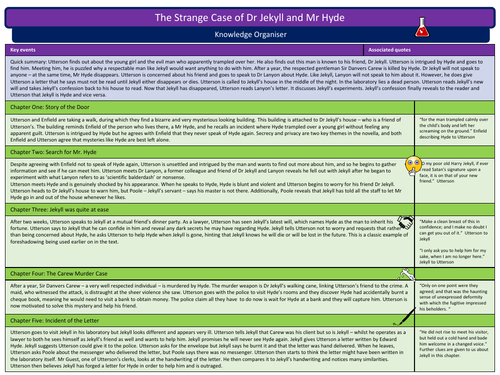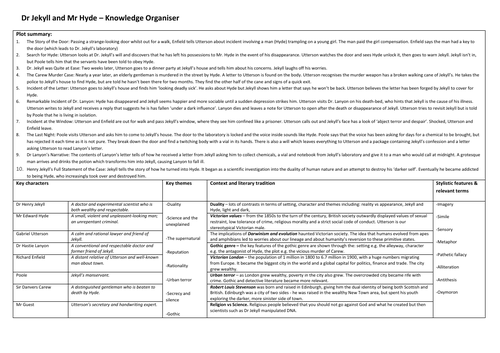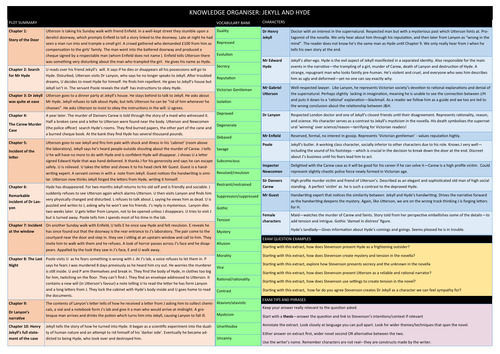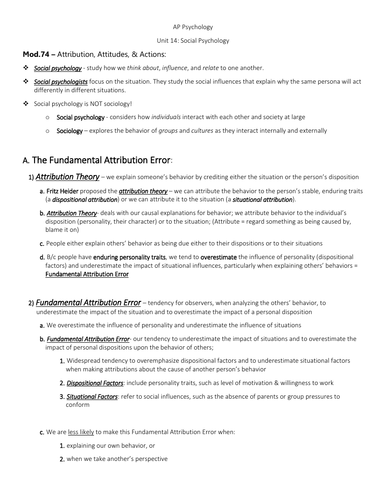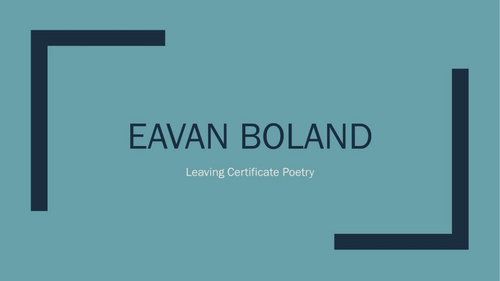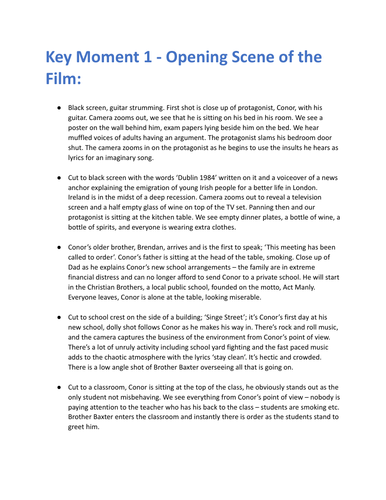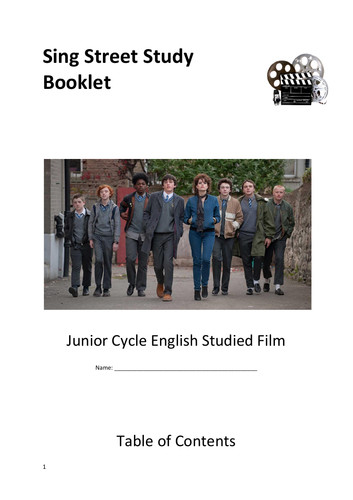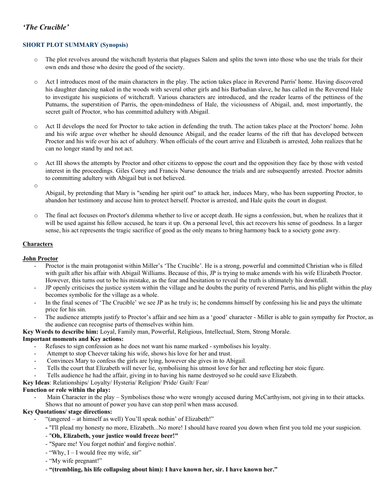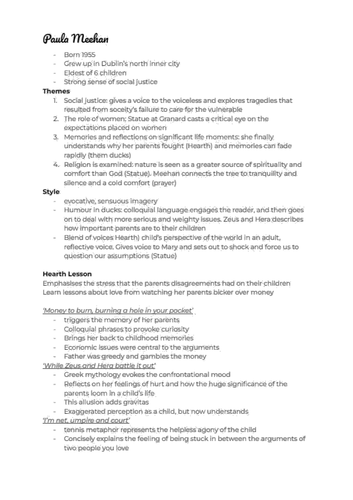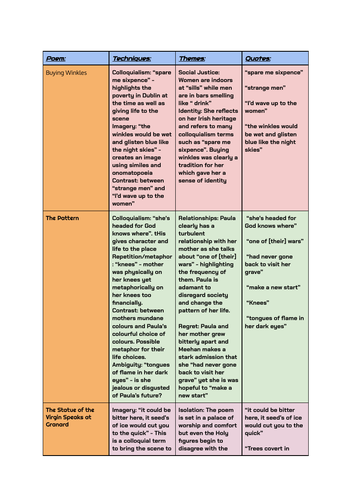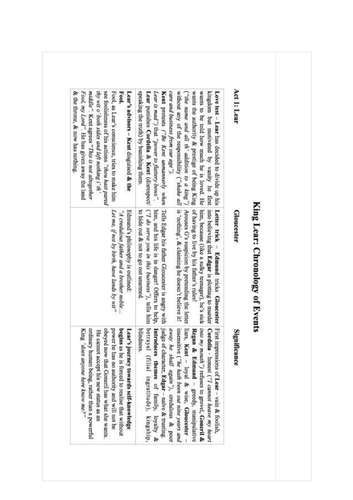
426Uploads
101k+Views
7k+Downloads
All resources

King Lear Act 1 Visual Revision Notes
This document is a visually engaging revision guide for King Lear Act 1, designed for Leaving Certificate students. It includes:
Key Plot Points from each scene, using emojis to highlight important events.
Character Analysis with key quotes for Lear, Goneril, Cordelia, Kent, and the Fool.
Themes of Authority, Kingship, Loyalty, and Betrayal, with colored headings and organized content for easy reference.

King Lear Act 1 Scene 5 Worksheet
Multiple Choice Questions
Four questions focusing on Act 1 of King Lear, specifically Lear’s actions and mental state. These questions assess students’ understanding of the early plot and the interactions between Lear, his daughters, and the Fool. Topics include Lear’s fear of madness, his confrontation with Goneril, and the role of the Fool as a truth-teller.
2. Fill-in-the-Blanks with Quotes
This section helps students recall and complete important quotes from the play. It includes four key quotes that deal with Lear’s growing awareness of his mistakes, his regret towards Cordelia, and his early expressions of madness.
3. PEE Chains (Point, Evidence, Explanation)
Two tasks encourage students to construct PEE paragraphs, which develop their ability to analyze Lear’s character development and his relationship with the Fool:
Task 1: Focuses on how Lear’s character changes from Act 1, Scene 1 to Act 1, Scene 5, particularly his growing fear of madness.
Task 2: Explores the Fool's role as Lear’s conscience and truth-teller, using sentence starters to help students analyze their interactions.
In both tasks, sentence starter suggestions for Point, Evidence, and Explanation are provided, giving students a structured approach to their analysis.
4. Matching Exercise – Quotes and Themes of Madness
This section is a matching exercise where students pair quotes from King Lear with corresponding themes related to madness. The quotes illustrate Lear’s fear of madness, regret, and identity crisis, while the themes highlight key aspects of Lear’s psychological unraveling and how it is reflected by the Fool.
The worksheet balances comprehension with deeper analysis, offering students both recall-based tasks and opportunities for analytical writing.

Narrative Writing Worksheet: Understanding Characters and Relationships Sally Rooney Normal People
Narrative Writing Worksheet: Understanding Characters and Relationships Sally Rooney Normal People

Act 1 King Lear Revision Worksheet
Product Description: King Lear Act 1 Detailed Revision Worksheet (Leaving Cert)
This comprehensive revision worksheet is designed to help Leaving Cert students thoroughly review Act 1 of Shakespeare’s King Lear. It includes a variety of exercises and questions to ensure a deep understanding of the play’s key events, characters, themes, and language.
Key features include:
Plot Summary Questions: Focused on the critical events of Act 1, each scene is broken down with targeted questions.
Character Analysis: Detailed questions to explore the motivations, flaws, and relationships of central characters such as Lear, Cordelia, Edmund, and the Fool.
Themes Exploration: In-depth questions on key themes, such as authority, loyalty, betrayal, and nature.
Close Passage Analysis: Students are prompted to analyze pivotal quotes and passages, revealing Shakespeare’s use of language and its thematic significance.
PEE Chain Writing Practice: Structured prompts guide students to write clear and evidence-based analytical paragraphs.
Key Quotes Identification: Matching exercises to help students identify and explain important quotes.
Multiple-Choice Questions: A quiz-style section that tests comprehension of key details in Act 1.
Ideal for in-class use or as homework, this worksheet equips students with the skills to analyze King Lear in preparation for their Leaving Cert exams.

King Lear Act 1 Revision sheet
Product Description: King Lear Act 1 Detailed Revision Worksheet (Leaving Cert)
This comprehensive revision worksheet is designed to help Leaving Cert students thoroughly review Act 1 of Shakespeare’s King Lear. It includes a variety of exercises and questions to ensure a deep understanding of the play’s key events, characters, themes, and language.
Key features include:
Plot Summary Questions: Focused on the critical events of Act 1, each scene is broken down with targeted questions.
Character Analysis: Detailed questions to explore the motivations, flaws, and relationships of central characters such as Lear, Cordelia, Edmund, and the Fool.
Themes Exploration: In-depth questions on key themes, such as authority, loyalty, betrayal, and nature.
Close Passage Analysis: Students are prompted to analyze pivotal quotes and passages, revealing Shakespeare’s use of language and its thematic significance.
PEE Chain Writing Practice: Structured prompts guide students to write clear and evidence-based analytical paragraphs.
Key Quotes Identification: Matching exercises to help students identify and explain important quotes.
Multiple-Choice Questions: A quiz-style section that tests comprehension of key details in Act 1.
Ideal for in-class use or as homework, this worksheet equips students with the skills to analyze King Lear in preparation for their Leav

King Lear Worksheet
Unlock your students’ understanding of Shakespeare’s King Lear with this detailed and structured worksheet focused on Act 1 Scene 1. This resource is perfect for helping students engage deeply with the text, encouraging close reading and textual analysis.
Key Features:
Guided Questions with Embedded Quotes:
Students are prompted to answer key questions about the scene, with a selection of quotes provided to support their responses. This helps them practice using evidence from the text to back up their analysis, following the PEE (Point, Evidence, Explanation) structure.
Character Analysis:
Explore the motivations and emotions of key characters like Gloucester and King Lear. Students are encouraged to analyze Gloucester’s complex feelings toward his son Edmund and Lear’s reasons for dividing his kingdom.
Matching Exercise - Daughters’ Responses:
A creative and interactive task where students match each of Lear’s daughters (Goneril, Regan, and Cordelia) to the correct adjective that describes their nature, and then connect this to a corresponding quote from the text. This exercise aids in developing critical thinking and comprehension skills.

AP Psychology Social Psychology NOTES – Attribution, Attitudes, & Actions:
AP Psychology
Social Psychology
– Attribution, Attitudes, & Actions:

Sing Street Key Moments Notes
Key Moment 1: Opening Scene
Key Moment 2: Starting the Band
Key Moment 3: Conor and Raphina
Key Moment 4: Brother Baxter Attacks
Key Moment 5: Parents’ Split
Key Moment 6: Brendan’s Breakdown
Key Moment 7: Drive It Like You Stole It
Key Moment 8: The Dance
Key Moment 9: Ending Scene

Sing Street Booklet
Sing Street Booklet
Introduction to Film Techniques/Vocabulary
Camera Shots and Angles
Details of the Film
Character List
Setting
Plot Summary
Music in the Film
Review of the Film
Key Moment 1: Opening Scene
Key Moment 2: Starting the Band
Key Moment 3: Conor and Raphina
Key Moment 4: Brother Baxter Attacks
Key Moment 5: Parents’ Split
Key Moment 6: Brendan’s Breakdown
Key Moment 7: Drive It Like You Stole It
Key Moment 8: The Dance
Key Moment 9: Ending Scene

Paula Meehan Notes
“Them Ducks Died for Ireland”
Sonnet - Reflection on 1916
“The Statue of the Virgin at Granard Speaks”
“Buying Winkles”
“The Pattern”
“Hearth Lesson”

Paula Meehan Quick Notes
coloured grid for poems
Buying Winkles
THe Pattern
The Statue of the
Virgin Speaks at
Granard
Hearth Lesson

Writing Map
Serves as a comprehensive guide for analyzing and writing about literature
Addresses questions related to characters, themes, and text exploration
Encompasses various elements:
Inference Phrases
Discourse Markers
Point Sentence Starters
Detailed breakdown of Language and Structural Techniques
Encourages identification and analysis of powerful words and phrases
Explores their effects, associated techniques, and impact on readers and author’s intentions
Provides a comprehensive list of language and structural techniques:
Adverbs
Imagery
Repetition
Parallel structure
And more
Facilitates a thorough examination of literary elements
Functions as a helpful tool for students or writers
Aids in organizing thoughts and responses when engaging with and writing about literature.

Sharp notes - King Lear
The notes collectively provide a comprehensive overview of key events, character dynamics, and thematic elements in Acts 1 through 5 of Shakespeare’s “King Lear.” The structured summaries cover Lear’s initial decision to abdicate, the dynamics between Lear and his daughters, the unfolding deceit by characters like Edmund, and the consequences that lead to madness, suffering, and ultimately, tragedy.
In Act 1, Lear’s decision to divide his kingdom and the subsequent flattery competition among his daughters showcase themes of authority, vanity, and the potential for deception. Act 2 introduces Edmund’s plot against his legitimate brother Edgar, setting the stage for betrayal and manipulation.
Act 3 delves into Lear’s descent into madness, the mistreatment he faces from his daughters, and the parallel storyline of Gloucester’s suffering. Act 4 portrays the consequences of the characters’ actions, including Gloucester’s attempted suicide and the reunion of Lear and Cordelia.
Act 5 reaches the tragic climax, featuring Lear’s heartbreaking realization of his mistakes, the death of key characters, and the play’s somber resolution. The notes capture the essence of each act, providing a condensed yet informative guide to the intricate narrative, character arcs, and the play’s central themes.









